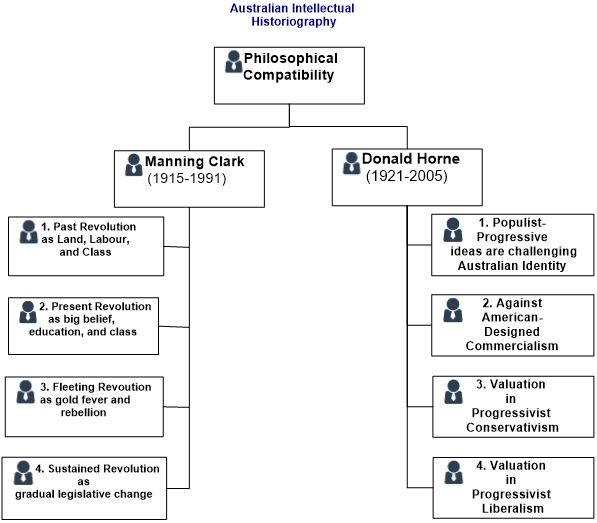The American-Australian Center-Centre was unfolded to me in article by Richard Lee Abrams, who asked recently in the City of Los Angeles, “Who Murdered the American Political Center?” There is a difference between the American Center and the Australian Centre, and it is not merely the difference of English spelling.
There are hidden concepts in historiography and sociology, and Abrams began to draw it out but stopped too short. Abrams has been an attorney, a realtor and community relations consultant as well as a CityWatch contributor, but his articles provide a decent beginning (a characteristic of both center and centre). The depth is achieved by the alleged source he introduced at the start of the article:
“We need no CSI forensic team to identity the culprit. It was the American Political Science Association (APSA). In 1950 it published Toward a More Responsible Two-Party System. At the time, it was nincompoopery based upon zero comprehension of American principles and was a formula for disaster. The rightful condemnation which it received, however, may have allowed it to survive as so many scholars thought it was too outrageously imbecilic to have any influence. They underestimated the gullibility of the American public and the machinations of anti-social power mongers who realized the division meant money and power.”
Abrams then follows up to a reference to another of his articles, Hate Money Stalks America, about the influence of money politics among radicalised Trumpers. In order to apply the critical thinking to the argument about what is the American Political Center, and how it was lost, I track through the citation and the surrounding academic literature. I found no title nor abstract in a JSTOR search (it has all of the relevant journal articles) of “Toward a More Responsible Two-Party System”. That is not particularly important, and could be just that Abrams has published the wrong title in the citation. It is not particularly important, since the literature overwhelming demonstrates a binary division between those who argue for Duopoly and those who argue that the Center-Centre requires the breakdown of the Duopoly, either in Centrism or Pluralism.
I have gathered the literature into two JSTOR folders where the articles focus on the historical period 1945-1975:
- Unit 00. American-Australian Political Center-Centre with 123 items;
- Unit 00.01 The Center of American Politics 1945-1975 with 145 items.
This is an ongoing project, but one article stood out:
Goren, P. (2002). Character Weakness, Partisan Bias, and Presidential Evaluation. American Journal of Political Science, 46(3), 627–641. https://doi.org/10.2307/3088404
The research approach (2002), in the abstract, mirror back the approach I have taken two decades later:
This article draws upon research on negativity bias and motivated reasoning to develop a theory explaining how and why partisan bias moderates the relationship between impressions of character weakness and evaluations of presidential candidates. Impressions of character weakness exist at the aggregate level, which center on the perceptions of the public as a whole, and the idiographic level, which center on individual differences in perceptions. The theory predicts the more strongly people identify with the opposition party of a presidential candidate, the stronger the relationship between impressions of character weakness and candidate evaluations. Analysis of 1984-1996 National Election Study data provides partial support for the theory. The results show partisan opponents rely more on perceptions of character weakness than partisan supporters when evaluating presidential incumbents and salient nonincumbents in the aggregate level models and that partisanship does not promote reliance on perceptions of character weakness in the idiographic level mode.
There are several points which align with my research of the 2020s (struggling without payment; send this blog article to decision-maker if you care, and ask to give me a contract), as an aggregate statement:
Impressions of character weakness exist at the aggregate level, which center on the perceptions of the public as a whole, and the idiographic level, which center on individual differences in perceptions.
In last half century and more, back to 1945, the American political center thinking has folding into the thinking of the Australian political centre, and this by being framework in personal and academic thinking, from:
- As directly in the American-Australian histories literature:
Progressivism:
Progress and Popular Thinking in the United States & Australia 1945-2020.
Australian-American Historiographies:
Summary on Clark’s Short History and the Age of Revolution;
Neville’s Organisation of Clark’s Short History.
The Overwhelming Subjection in Literature:
The Dirge for a Sentimental Bloke;
The Grapes of Wrath: A Retrospect on the Folkish Expression of Justice in Popular Culture and Family.
The American Modernism of The Great Gatsby: Concepts of Landscape, Persons, and Time-Past
The work of Professional History and Philosophy in Queensland:
Humanism in Australia and United States:
- As encompassed in the global perspective of the American-Australian histories literature:
Anglo-American Major Belief-Doubt Systems;
Geo-Political Debate in Australia: An American-Australian Relational (Intellectual-Cultural) Reading.
This is the beginning of the project – a beginning of the last decade. Will anyone pay income for me to complete the project; so, I can stay alive to complete the project.
REFERENCES (other than the citations of my previous works)
Abrams, Richard Lee (2024). Who Murdered the American Political Center? CityWatch, March 28 2024.
Abrams, Richard Lee (2021). Hate Money Stalks America, CityWatch, April 08 2021.
Goren, Paul (2002). Character Weakness, Partisan Bias, and Presidential Evaluation. American Journal of Political Science, 46(3), 627–641. https://doi.org/10.2307/3088404
Featured Image: American-Australian-Intellectual-Cultural-Relations
Neville Buch
Latest posts by Neville Buch (see all)
- J. D. Vance’s Insult to America is to Propagandize American Modernism - July 26, 2024
- Why both the two majority Australian political parties get it wrong, and why Australia is following the United States into ‘Higher Education’ idiocy - July 23, 2024
- Populist Nationalism Will Not Deliver; We have been Here Before, many times… - July 20, 2024


